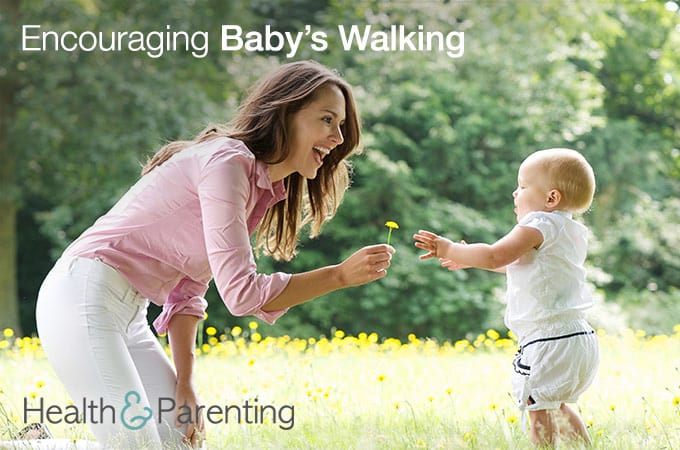Hopefully, you have your camera ready when your little one takes his first steps. Walking is a big developmental milestone you may be eagerly anticipating.
When you baby walks is dependent on several factors, such as his muscle strength, coordination and temperament. For example, a high energy baby may be ready to get going sooner than a mellow, cautious baby.
Most babies start to walk between 12 and 15 months, but that is not set in stone. Try not to worry if your baby is taking her time learning to walk. She will walk on her timetable. But if you have any concerns, speak to your pediatrician.
Although babies walk at different ages, there are things you can do to encourage your baby to take that adorable first step. For example, make sure your baby gets plenty of tummy time from a young age. Tummy time helps strengthen your baby’s back muscles, which is essential for walking.
When your baby is strong enough to sit up, roll a ball back and forth to her. As she reaches for the ball, she moves forward and back and side to side. All these movements help her strengthen muscles and develop balance.
As your little one gets older, play games that encourage motor skill development. For example, get down on the floor and crawl around with your baby chasing him. This may make your baby move faster, and helps improves his coordination.
Of course, standing is a precursor to walking, so you can also help your baby develop this important skill. While your baby is sitting, hold his hands and pull him up to a standing position. Once your little cruiser gets to a standing position, he may not know how to get back down. Show him how to bend his legs to sit back down without taking a tumble.
Push toys can also help your baby get the hang of putting one foot in front of the other. Push toys, such as a pint-sized shopping cart or push truck help your baby develop balance and coordination. Look for a toy that has a wide base for support and won’t tumble over while your baby is holding onto it.
Consider skipping the socks and shoes indoors. It’s easier for your baby to learn to walk if her tootsies are bare. Your baby’s bare feet grip the floor better than when she is wearing socks. You may also want to avoid walkers since they may prevent upper leg muscles from developing properly, which delays walking.
Make sure you have updated your baby proofing since she’ll be on the move. Lastly, offer lots of praise and encouragement, and before you know it, you will be chasing a very quick toddler around.
Written by MaryAnn DePietro @ writerlady34
This information is not intended to replace the advice of a trained medical doctor. Health & Parenting Ltd disclaims any liability for the decisions you make based on this information, which is provided to you on a general information basis only and not as a substitute for personalized medical advice. All contents copyright © Health & Parenting Ltd 2016. All rights reserved.










